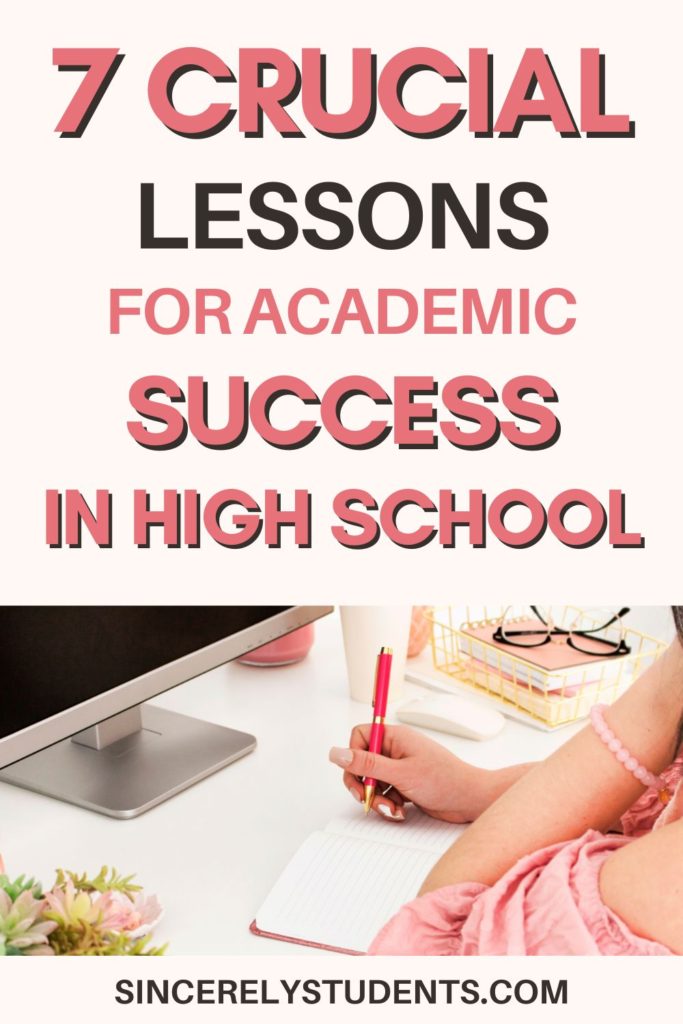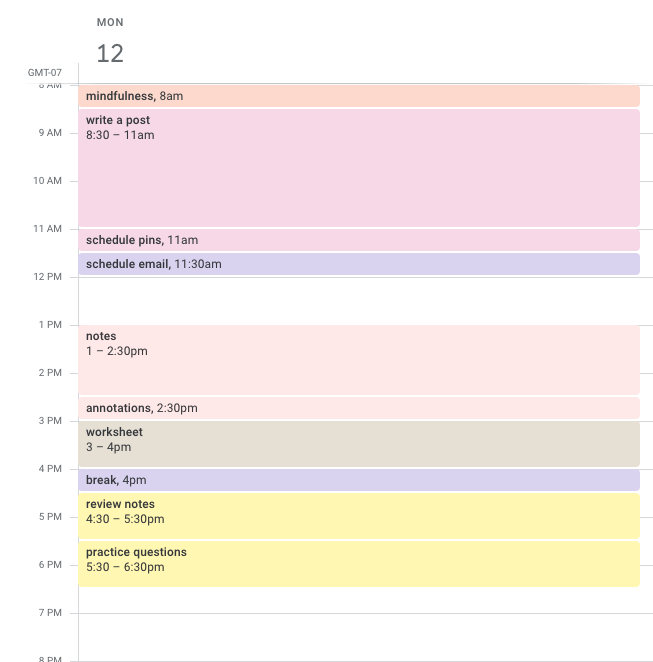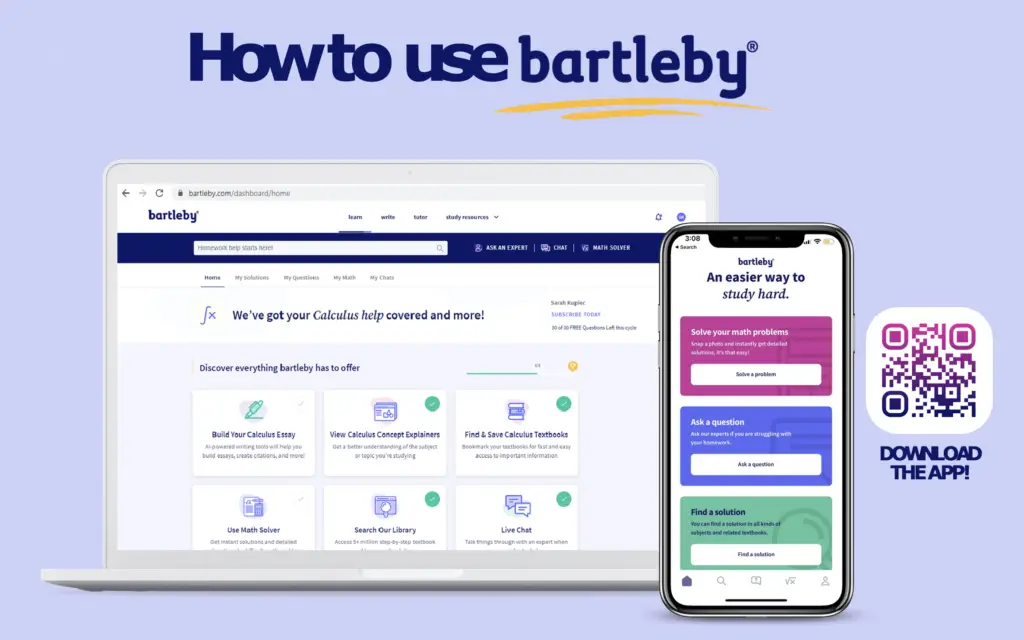It’s that time of the year again– back-to-school season! During this exciting (or dreadful) time, students are busily preparing for a new semester of learning, whether it be finding motivation, doing extra readings, or buying school supplies.
But if you’re looking to achieve true academic success, simply owning the best pens and notebooks won’t be enough. In this post, I’ve compiled the 7 crucial lessons I learned in high school to help me graduate with a 4.34 weighted GPA while maintaining a healthy social life and mental health.
If you’re curious as to how I did it, read this post and find something to change in your current study habits. And without wasting more time, let’s get into the post!
Disclosure: This post is sponsored by Bartleby. All opinions are my own.

My Favorite School Supplies
In all honesty, you don’t need many material items to succeed in school. By my junior and senior years of high school, my backpack had thinned down to just the bare minimum. Here is a partial list of what I carried:
- A sturdy backpack. My Jansport backpack lasted me all four years and fit everything I needed and more.
- Pencils, pens (black and blue especially), and erasers.
- Either a 3-ring binder or a sturdy folder. In my freshman year, most teachers required 3-ring binders to store papers. In my senior year, so many of my teachers used digital documents that I only needed to bring a thin folder.
- PS. You do not need a fancy, expanding, padded binder. A simple one worked perfectly fine in all of my four years.
- A dependable laptop. I used my laptop almost every single day in high school, and I am confident that more and more assignments will be online in the coming months and years.
- An iPad. During school, if teachers allowed it, I took the majority of my notes on my iPad. However, this is not essential, and it is up to you (and your teachers’ preferences) to decide whether or not you need it.
- A water bottle, wallet, snacks, hand sanitizer, mints, personal hygiene items…
Now, let’s get into the actual study tips!
Practice > Reading (Sometimes)
For many students who never really learned how to study, memorization is their favorite technique. However, if you observe the examples around you, it is not those who spend nights memorizing information who get the best grades.
This is because memorization does not help you understand and learn. As you progress through your education, you will realize that teachers and professors don’t ask you questions that can be answered with just what you memorized. Application is key.
To be able to apply what you learned to different questions and scenarios, you must first gain a deeper understanding of the facts. This requires a combination of reading and practicing.
For example, let’s suppose that you’re learning about enzymes in AP Biology. Once you’ve read the textbook and understood that enzymes help speed up chemical reactions by interacting with molecules, it’s time for practice. Review actual chemical processes like DNA replication and see how and which enzymes function. Consider what happens if an enzyme faces inhibition.
In short, you must think beyond what you’ve read. And practice is the easiest way to do that.
Note: practice is especially important for standardized testing. Read this post for my takeaways about SAT testing: How To Raise Your SAT Score Quickly & Effectively.
Notes Aren’t That Important
Before I go on, let me clarify the statement above. I condone and recommend taking notes, but they’re not as important as they may seem when you first begin high school. Notes are for your own studying purposes; by your senior year, teachers might not ever even look at them.
If you find that taking notes truly helps you process information and remember them, please keep taking them! If you believe that your notes help but would like to make them more effective, check out this post for my tips on note-taking.
On the other hand, if you tend to spend hours trying to take the most comprehensive (copying lines and paragraphs from the textbook) or the most aesthetic (highlighting every vocabulary word you see and using all sorts of colors and fonts) notes, it’s time to pause and rethink this strategy.
Are you maximizing your time? Are you really understanding the information and learning, or are you just trying to take notes? If it’s the latter, either try to improve your note-taking, or find another study strategy completely (such as reteaching, application practice, or discussions).
Annotating Is A Skill
In my high school social studies and literature classes, I had to annotate a lot of increasingly difficult readings. And I used to despise such annotations because I didn’t know how to properly absorb information from them and therefore often received lower scores on them when they were graded.
However, once I realized that annotations are meant to invoke further thinking and discussion, it became much easier for me.
Annotating documents isn’t simply highlighting key dates and underlining key figures. It doesn’t matter how many colors of highlighters you’re using– it’s how you’re thinking about the words you’re highlighting.
Now, I only use three things when annotating: a black pen, a highlighter, and a pencil.
Typically, I use the pen and highlighter to emphasize information I found interesting or important, and (this is important!) I always use a pencil to make notes in the margins.
The margins consist of my questions, connections made, explanations in my own words, clarifications, and other notes. These are what enabled me to really understand and learn beyond the facts that I highlighted and memorized from the reading.
Here are some questions you can answer in your margins to prompt further thinking:
- Why did this person/group feel motivated to do this?
- The article didn’t mention any, but what are the possible causes/effects of this action/phenomenon?
- What is the tone here? What does the author really mean?
- Was this person/group’s action the proper one to take? If I were in this position, what would I have done?
Time Management Is Key
Everyone lives the same 24 hours each day, but some people are able to get everything done, and do it well. How? Time management.
I have an entire post dedicated to managing your time, so I’ll just briefly talk about– in my opinion– the most effective way to manage time: use timetables or time blocks.
I recommend setting up a digital calendar (I use the default Apple one) since it’s easy to access and edit. In addition, utilize different calendars/labels and color-code them so you can differentiate between categories of tasks at a glance, like this:

Depending on your preferences, you can choose to schedule everything in your life, or just the non-negotiables. As you can tell from the image of my calendar above, I don’t schedule everything; there are blank spaces for morning routines, downtime, etc.
But if you’d like, you can fill up the entire day with events like “wake up,” “eat breakfast,” “take a break,” “read,” and “wind down.”
However, the most important part of time blocking is not to make your calendar as full as possible. It’s to ensure that you are managing your time wisely and following through with your plan. This way, you won’t have to worry about pulling all-nighters trying to finish homework or finding excuses for why you didn’t finish.
Smart time management takes time to build into a habit, but if you make it a point to consistently create and follow your schedules, you’ll soon get the hang of it.
Find Inspiring People
High school is a time of exploration and self-discovery. If you surround yourself with the right people, you’ll feel a lot more supported as you search for and step on various paths.
When you first step on campus, get to know the people around you in class. Start with small talk and introduce yourself, ask about their day, talk about the class you’re in and the content you’re learning. Ask small favors of them like borrowing a pencil or a piece of paper (don’t do this every day without repayment, though, as it will get annoying).
As the semester goes on, find and join a few clubs that you find interesting. You’ll find a group of people with similar interests as you, and possibly become great friends with some of them.
Your friends will become part of your support group, and you can turn to them when you need advice. Similarly, when they need help, they can trust you. Together, you can become better.
Along with your friends, also find someone you look up to. This could be an older student, a friend, a sibling… anyone who inspires you to become better. You can let this figure motivate you, and– if you have the chance– try to get to know them personally.
Inspiring people will motivate you to work harder, and when you struggle, they can help. Building connections is important, and even more so as you get older. So start doing it now!
Find & Use Your Resources
Don’t limit yourself to your textbooks, as they are not the only (and sometimes not the best, either) resource you have. Especially if you find that textbooks are difficult to understand, consider using other additional resources like the following ones.
YouTube
YouTube is home to millions (maybe billions) of videos, and a lot of them are educational. While you can– and I recommend doing so– search up any topic that confuses you and find a clarifying video, here are a few of my favorite channels:
- Heimler’s History for high school AP History classes
- patrickJMT for calculus and linear algebra
- The Organic Chemistry Tutor for maths and sciences
- 3Blue1Brown for higher level maths
- minutephysics for physics
- Bozeman Science for sciences
- freeCodeCamp for computer science-related subjects
Again, feel free to simply search up a topic on YouTube. You can find videos on almost any subject, so, even if you can’t find the right video in the above channels, don’t despair and search a little broader.
Bartleby+
Bartleby+ is a paid all-in-one study resource and homework help platform developed by Barnes & Noble Education and focuses on providing academic help to high school and college-aged students.
A subscription to Bartleby+ includes textbook & homework solutions (with step-by-step explanations), an AI calculator tool that solves a picture of your math problem, and on-demand tutors– knowledgeable individuals like teachers, professors, and Ph.D. students– to answer your toughest questions.
Bartleby+ also has a comprehensive Essay Editor built into their platform for around-the-clock writing help. It can create instant citations, check for grammar and spelling mistakes, scan your papers for plagiarism, and more. It also offers preliminary scoring, where AI analyzes your essay and estimates the grade you may receive.
With homework, study, and writing tools available 24/7, bartleby+ is one of the most powerful resources for students. You can try bartleby+ for a reduced price of $6.99 (over 50% off) for the first week.

Of course, tutoring services are often available offline as well. If you’d like to find cheap– or even free– local tutoring, consider asking teachers or counselors at your high school. There are often peer tutoring services that you can visit during after-school hours.
AP Classroom
AP Classroom was one of my main sources of practice problems for AP classes. Because AP exams are administered by CollegeBoard, AP Classroom (which is run by CollegeBoard) is a trusted source of practice problems.
After you register for an AP class, your teacher will provide you with a code to join the class in AP Classroom. Once you do so, you’ll have access to what your teacher assigns; these can be Daily Videos (short lectures) or practice multiple-choice/free-response questions.
If all the practice assignments are “locked” on AP Classroom, you cannot access them. The only way to open them is to ask your teacher to unlock them. If your teacher doesn’t do that on their own, feel free to ask!
If your teacher refuses to unlock the questions for some reason, try searching up the same assignment on Quizlet. Since the questions on AP Classroom are the same, past students may have uploaded the questions (and answers) online. Just make sure you’re staying accountable and answering questions on your own!
Khan Academy
Khan Academy is 100% free and home to readable articles, video lectures, practice questions, and full practice exams for many subjects. It is one of the best resources for students, and is free forever.
It is up to you how you want to go through the Khan Academy courses. If you’re like me and simply using it as a supplement, picking and choosing specific videos or articles to watch/read is enough. Otherwise, you can also choose to complete entire lessons and courses at your own pace.
One of my favorite uses of Khan Academy was the free SAT practice questions and exams. The organization partnered with CollegeBoard to provide you with 8 full exams and solutions after you finish.
The best way to beat standardized testing (for example, AP exams and the SAT) is to practice, practice, practice. And Khan Academy is one of the best resources for that.
RELATED POST: How To Self-Study For The SAT And Get A 1500+
Talk To Your Teachers
Last but certainly not least, learn to talk to your teachers. This will become especially important in college, for professors will become part of your network. So start getting comfortable talking to teachers in high school!
Though you might not be best friends with your teacher, he or she is much more knowledgeable than you in the subject and wants you to learn from him or her. In short, your teacher is there to help you.
If you have a homework question, a test question, or a general question that was never answered by the lecture or textbook, ask your teacher! Even if he or she doesn’t know the answer immediately, you can figure it out together. Learning and building a relationship with your teacher– two birds with one stone!
In addition, if there is ever confusion about missing points in your grade book, don’t just wonder and hold grudges. In my experience, whenever mistakes happened, my teachers were happy to fix them. You’re likely not at fault in this scenario, so don’t be scared!
Conclusion
At times, high school academics can seem tough. But don’t easily give up– there are ways to make it easier! I hope these 7 pieces of advice gave you some insight into the secrets of top students, and that you will follow them and become a top student yourself!
If you enjoyed this post, check out more like this one below: